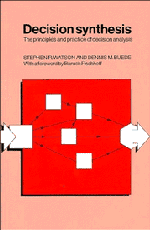1 - INTRODUCTION AND READER'S GUIDE
Published online by Cambridge University Press: 16 September 2009
Summary
This is a book about decision-making – about how people do make decisions, and about how they may improve their decision-making. To say this makes some assumptions, and, before we go on to show the reader how decision-making will be tackled in this book, as we will do in the rest of this introductory chapter, we will examine these assumptions.
First, can decision-making be studied? One of the authors, when discussing his research work with a senior (and traditionally minded) colleague, was asked what subject he studied. On replying that he studied decision-making, the response was “Is that a subject?” Many readers will not need our prompting to answer that question affirmatively, but it is as well to spell out the nature of our study. It is principally concerned with the determinants of decision – that is to say, what it is that makes us take one course of action rather than another. In some cultural and intellectual traditions there is an easy answer to this question. Extreme forms of Calvinism, for example, itself a particularly severe kind of Protestantism, deny that free will exists; nobody may make decisions, therefore, since everything is fore-ordained by God. Then, as Howard (1980) points out, in an excellent article on the philosophy of analyzing decisions, many Eastern philosophies will not see the study of decision-making as a fruitful endeavor, since in these philosophies one accepts the unfolding of life as it presents itself.
Information
- Type
- Chapter
- Information
- Decision SynthesisThe Principles and Practice of Decision Analysis, pp. 1 - 6Publisher: Cambridge University PressPrint publication year: 1988
